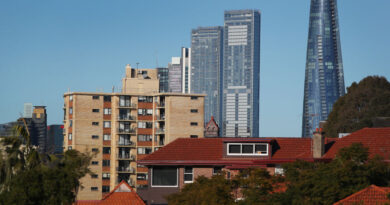Former Christian Lobby Leader Encourages Australians to Rethink Negative Views on America
Christian commentator Martyn Iles points out that Australians often have a negative view of Americans, yet rely on the US for protection from threats.
Amidst the aftermath of the Trump administration’s global tariffs, the former head of the Australian Christian Lobby emphasizes that Aussies should be more appreciative and realistic about the relationship between the US and Australia.
Despite ongoing negative media coverage about the Trump presidency and the impact of tariffs on Australian beef exports, Martyn Iles urged his fellow Australians not to take the security partnership for granted.
“We often mock when Americans talk about ‘Freedom!’ because we believe we are as free as they are.
“But the reality is different. The laws, mindset, and behaviors are vastly distinct in this aspect.”
Iles, drawing from his experience living in the United States for two years, emphasized that the US’s belief in freedom surpasses what Australians share.
He also highlighted that despite U.S. President Donald Trump and the Republican Party winning various elections, Americans still ridicule their leader.
“Despite this, the West, including Australia, heavily rely on the USA for our protection and survival.”

President Donald Trump, left, and Secretary of Defense Pete Hegseth listen during an event in the Oval Office of the White House in Washington, Friday, March 21, 2025. Pool via AP
Strengthening Ties with the CCP And Relying on US Protection
Iles also noted Australia’s efforts to enhance relations with China despite the Chinese Communist Party (CCP) posing a direct challenge to the West.
“Although China has contributed to our prosperity, we remain in close proximity,” Iles remarked. “This is a Marxist regime with imperial ambitions.”
He added that CCP influence extends across Europe, from Germany to Greenland.
“In a way, we have struck a deal of a lifetime with the USA that basically says, ‘When threats arise, you’ll safeguard us, right?’ because we are unable to defend ourselves.
“As a result, we live peacefully. However, we continue to erode our freedoms, support China, and lack interest in our military because we rely on Uncle Sam.”

The Chinese Peoples Liberation Army-Navy Fuchi-class replenishment vessel Weishanhu in the Solomon Sea. Courtesy of the Australian Defence of Department
Iles pointed out the common tendency for Australians to look down on Americans, stating that “we don’t hold our protectors in high esteem.”
“Now, the USA is finally drawing a line. I’m here to convey the sentiment; that’s the situation. Trump is addressing the desires of the people in this respect. They’ve had enough,” he remarked.
“While we act surprised and feel wronged. We behave as if we lack self-awareness.”
Is Australia a Strong Military Force?
Iles also highlighted the vast difference between Australia’s military strength and that of the United States.
“The US boasts around 470 ships in its navy, including 11 aircraft carriers, 69 submarines, 75 destroyers … with an additional 110 new ships in development.
“In comparison, Australia has approximately 30, consisting of three destroyers, seven frigates, and seven outdated submarines. The UK fares slightly better, with about 60.”
The United States possesses over 14,000 military aircraft, while Australia has 252 and the UK has 556.
Moreover, with close to 1 million military personnel, the US far surpasses Australia’s 45,000 personnel.
Iles advocated for an increase in Australia’s military spending to 3.5 percent of GDP, abolishing any tariffs on US goods, and aligning more closely with the US rather than China.
Presently, Australia allocates 2.05 percent of its GDP to defense.
“Implementing these basic measures would yield significant benefits, establish a solid foundation for a shared alliance, and overall be beneficial,” he concluded.
Elbridge Colby, the nominee for head of policy at the US Defense Department, has urged Australia to raise defense spending to at least 3 percent of GDP.
Forecasts suggest that Australia’s defense spending is expected to reach 2.4 percent of GDP by the mid-2030s, with the Labor Party committing $50 billion over a decade. Opposition Leader Peter Dutton has also pledged to increase spending to 2.5 percent of GDP.
In contrast, the United States dedicates 3.4 percent of its GDP to defense—equivalent to the combined military spending of the next 15 largest countries, including China.
According to Iles, America’s formidable military strength does not just stem from financial resources but also from something more.
“The US has a warrior culture,” he explained.
“Men engage in shooting and hunting activities frequently, veterans receive preferential treatment in various aspects, and uniformed individuals are thanked numerous times daily.
“How many young British men are willing to defend their country? Now, consider the same for young American men. The contrast is stark.”





